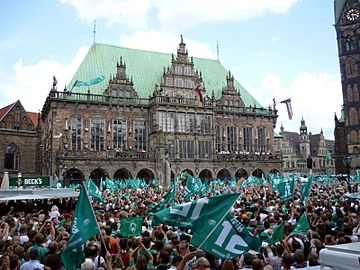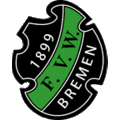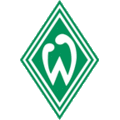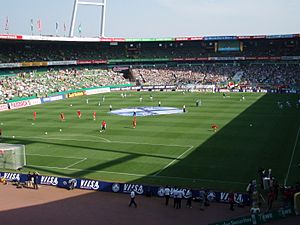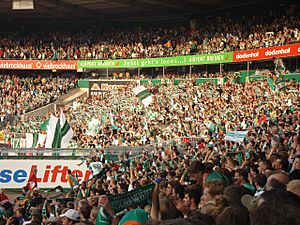SV Werder Bremen facts for kids
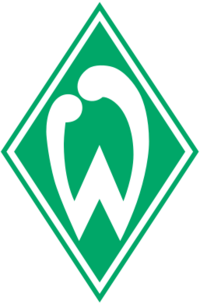 |
|||
| Full name | Sportverein Werder Bremen von 1899 e. V. |
||
|---|---|---|---|
| Nickname(s) | Die Werderaner (The River Islanders) Die Grün-Weißen (The Green-Whites) |
||
| Short name | Werder, Bremen | ||
| Founded | 4 February 1899 | ||
| Ground | Weserstadion | ||
| Capacity | 42,100 | ||
| President | Hubertus Hess-Grunewald | ||
| Head coach | Horst Steffen | ||
| League | 2. Bundesliga | ||
| 2020–21 | Bundesliga, 17th of 18 (relegated) | ||
|
|||
Sportverein Werder Bremen von 1899 e. V. is a famous German professional sports club from Bremen. People usually call them Werder Bremen, Werder, or just Bremen. The club started on February 4, 1899.
Werder Bremen is best known for its professional association football team. This team plays in the Bundesliga, which is the top football league in Germany. Werder Bremen has played in the Bundesliga for many seasons, just like Bayern Munich. They are also one of the top teams in the all-time Bundesliga table.
The team has won the German championship four times. They have also won the DFB-Pokal (German Cup) six times. Werder Bremen won their first major trophy, the DFB-Pokal, in 1961. Their most recent cup win was in 2009. They won their first German championship in 1965 and their latest in 2004. In 2004, they won both the league and the cup, which is called the double.
In European competitions, Werder Bremen won the European Cup Winners' Cup in 1992. They were also runners-up in the UEFA Cup in 2009.
Werder Bremen has played at the Weserstadion since 1909. They have a big rivalry with Hamburger SV, another club from northern Germany. This rivalry is called the Nordderby (North derby). In April 2022, Werder Bremen had over 40,000 members.
Contents
Club History: From Students to Champions
How Werder Bremen Started (1899–1970)
On February 4, 1899, a group of 16-year-old students founded FV Werder Bremen. They started the club after winning a football in a tug of war game. The name "Werder" means "river peninsula" in German. This name came from the riverside field where they played their first matches.
On September 10, 1899, Werder won their first game 1–0 against ASC 1898 Bremen. In 1900, the club helped create the German Football Association (DFB). Werder quickly became successful, winning many local championships. By 1903, all three of their teams won their local leagues. The club became so popular that they were the first in Bremen to charge money for people to watch their home games.
After World War I, the club added other sports like athletics, baseball, and tennis. On January 19, 1920, the club changed its name to Sportverein Werder Bremen, which is its current name. In 1922, they hired their first professional coach, Ferenc Kónya from Hungary. Werder often played in the play-offs for the Northern German football championship in the 1920s and early 1930s.
Werder won the Gauliga Niedersachsen four times between 1934 and 1942. Winning the Gauliga meant they could play in the national championship. Their best result was reaching the quarter-finals in 1942. Many Werder players worked at a tobacco factory nearby. Because of this, the team was sometimes called "Texas 11" after a cigarette brand.
After World War II, Werder Bremen was one of the top two teams in northern Germany, along with Hamburger SV. In 1961, Werder won their first DFB-Pokal by beating 1. FC Kaiserslautern 2–0 in the final. In 1963, they finished second in their league, which earned them a spot in the first-ever 1963–64 Bundesliga season. Werder won their first German championship in 1965, finishing ahead of 1. FC Köln. They were runners-up in 1968, but then spent a few years lower down the league table.
Ups and Downs (1970–2000)
In 1971, during a game against Borussia Mönchengladbach, a player fell into Werder's goal net. The goalpost broke, and the goal fell down. The game was stopped, and Werder was given the win. The team was nicknamed "Millionenelf" (Million Eleven) because they signed some expensive players. However, their performance did not improve, and in 1980, Werder was relegated from the Bundesliga for the first time.
The team quickly won the 2. Bundesliga Nord title in 1981 and returned to the top league. Manager Otto Rehhagel joined in April 1981. Under him, Werder finished second in the Bundesliga three times in the 1980s. In 1983 and 1986, they lost the title by a very small difference in goals. In 1986, Werder missed a penalty kick in a crucial game against Bayern Munich, which cost them the title.
Werder won their second Bundesliga title in 1988. They also reached the semi-finals of the UEFA Cup that year. In 1990, Bremen beat the strong team of Napoli (who had Diego Maradona) 8–3 over two games in the UEFA Cup.
Werder reached the DFB-Pokal final in 1989 and 1990, and finally won it in 1991. They also won the UEFA Cup Winners' Cup in 1992, beating AS Monaco 2–0 in the final. In 1993, the team won their third Bundesliga title. They won their third DFB-Pokal in 1994. Werder was the first German club to reach the group stage of the new UEFA Champions League in 1993–94. In one famous game, they were losing 3–0 to Anderlecht but came back to win 5–3. This was called the "Wunder von der Weser" (Wonder of the Weser). Many international players played for Werder during this time, like Mario Basler and Rudi Völler.
In 1995, Werder finished second in the Bundesliga. After 14 years, manager Otto Rehhagel left the club. He was Werder's most successful manager. After him, other managers did not win any major trophies. In May 1999, former Werder player Thomas Schaaf became the new coach. He helped the team stay in the Bundesliga and won the DFB-Pokal just weeks later.
Recent Years (2000–Present)
Werder's league performance improved in the 2000s. In 2004, Bremen won both the Bundesliga and the DFB-Pokal, achieving the double for the first time. They were only the third club in Bundesliga history to do this. The team also often played in the Champions League during this decade. In 2006, Werder beat their rivals Hamburger SV to qualify for the Champions League.
In 2007, Bremen reached the semi-finals of the 2006–07 UEFA Cup, but lost to RCD Espanyol. In 2009, the team reached the UEFA Cup final, losing to Shakhtar Donetsk. However, they won the DFB-Pokal final by beating Bayer Leverkusen 1–0. In April and May 2009, Werder played Hamburg four times in 19 days in different competitions and beat them in the league, DFB-Pokal, and UEFA Cup.
During this time, Werder sold several players for large transfer fees, including Mesut Özil and Claudio Pizarro. In 2013, Thomas Schaaf left the club after 14 years as manager. In 2020, Bremen avoided relegation from the Bundesliga by winning a play-off match. However, in 2021, they finished 17th and were relegated to the 2. Bundesliga for the first time since 1980. The team quickly returned to the Bundesliga in 2022 after finishing second in the 2. Bundesliga.
Team Players
Current Squad
|
|
Players on Loan
|
Other Teams and Notable Players
- Werder Bremen also has a reserve team, SV Werder Bremen II.
- You can find a list of many famous Werder Bremen players here.
- The number 12 is "retired" by the club. This is a special way to honor the club's amazing supporters, who are seen as the "twelfth man" on the field.
Team Managers

Since the Bundesliga started in 1963, Werder Bremen has had 24 different managers. Otto Rehhagel was the manager for the longest time, staying for fourteen years. Some managers, like Hans Tilkowski and Otto Rehhagel, had two different periods managing the team.
| Name | Date | Notes |
|---|---|---|
| 1 July 1963 – 30 June 1965 | ||
| 1 July 1965 – 4 September 1967 | ||
| 9 September 1967 – 30 June 1969 | ||
| 2 March 1968 –19 October 1968 | Filled in for Fritz Langner for four Bundesliga matches | |
| 1 July 1969 – 16 March 1970 | ||
| 17 March 1970 – 30 June 1970 | ||
| 1 July 1970 – 28 September 1971 | ||
| 28 September 1971 – 24 October 1971 | ||
| 25 October 1971 – 30 June 1975 | ||
| 8 May 1972 – 30 June 1972 | Filled in for Sepp Piontek for two Bundesliga matches | |
| 1 July 1975 – 28 February 1976 | ||
| 29 February 1976 – 30 June 1976 | ||
| 1 July 1976 – 19 December 1977 | ||
| 20 December 1977 – 31 December 1977 | ||
| 1 January 1978 – 30 June 1978 | ||
| 1 July 1978 – 28 January 1980 | ||
| 29 January 1980 – 20 February 1980 | ||
| 21 February 1980 – 30 June 1980 | ||
| 1 July 1980 – 1 April 1981 | ||
| 2 April 1981 – 30 June 1995 | ||
| 1 July 1995 – 9 January 1996 | ||
| 14 January 1996 – 20 August 1997 | ||
| 21 August 1997 – 20 October 1998 | ||
| 22 October 1998 – 8 May 1999 | ||
| 9 May 1999 – 15 May 2013 | ||
| 15 May 2013 – 25 May 2013 | Caretaker manager for one Bundesliga match | |
| 1 June 2013 – 25 October 2014 | ||
| 25 October 2014 – 18 September 2016 | ||
| 18 September 2016 – 30 October 2017 | ||
| 30 October 2017 – 16 May 2021 | ||
| 16 May 2021 – 30 June 2021 | Caretaker manager for one Bundesliga match | |
| 1 July 2021 – 20 November 2021 | ||
| 20 November 2021 – 28 November 2021 | Caretaker manager for one match | |
| 28 November 2021 – 27 May 2025 | ||
| 1 July 2025 – |
Coaching Staff
| Position | Staff |
|---|---|
| Head coach | Horst Steffen |
| Assistant coach | Christian Groß Raphael Duarte |
| Goalkeeping coach | Christian Vander |
| Director of football | Tim Barten |
| Team manager | Dustin Haloschan |
Team Colors and Logo
Club Colors
Werder Bremen's main colors are green and white. Their club song, "Lebenslang Grün-Weiß" (Green-White Forever), talks about these colors. The team's home shirts are usually green or white. They haven't used a mostly white home shirt since the 2008–09 season. Sometimes, they have used different colors. For example, from 1971 to 1973, they wore red and white, which are the colors of the city of Bremen. In 1976, they even wore blue because of a shirt sponsor.
Club Logo
Werder Bremen has used several different logos over the years. Their first badge in 1899 was a monogram with the letters "FVW". This stood for "FV Werder Bremen," as the club was called back then. In 1902, they got a green logo with "1899" and "F.V.W." on it.
In 1911, the logo changed to black with a green stripe. In 1924, they created a green, oval-shaped logo with a big white "W". This oval shape changed to a diamond shape in 1929, which is similar to the club's current logo. For a short time in the 1970s, they used the coat of arms of Bremen as their logo. Also, a special star is shown above the logo on the team's shirts. This star means they have won four Bundesliga titles.
Home Stadium: Weserstadion
Werder Bremen has played its home games at the same place since 1909. That year, a sports field with a wooden grandstand was built there. In 1926, a new grandstand, changing rooms, and a restaurant were added. The place was first called "ATSB-Kampfbahn". In 1930, it was named the "Weserstadion" for the first time.
After World War II, the stadium was used for American sports like baseball. In 1947, it reopened as a shared sports venue and was again called "Weserstadion".
After Werder won their first Bundesliga title in 1965, the corner stands were made bigger. In 1992, Bremen was the first German club to add special skyboxes for VIPs. In 2002, part of the running track was removed to make more space for fans. The Weserstadion was renovated from 2008 to 2011. Its outer walls were covered with solar panels, and a new roof was built. The ends of the stadium were rebuilt closer to the field, removing the rest of the old athletics track. The stadium can now hold 42,100 people.
Fans and Rivals
Werder Bremen has a long-standing rivalry with Hamburger SV, another club from northern Germany. This is known as the Nordderby (North derby). The rivalry is not just about football; it also comes from a historic competition between the cities of Hamburg and Bremen that goes back to the Middle Ages. The two cities are about 100 kilometers apart and are the biggest cities in northern Germany.
Bayern Munich is another rival, especially since the 1980s when both teams were competing for top honors. Since the mid-2000s, Werder fans have also developed a dislike for Schalke 04. This is because Schalke signed several Werder players over the years, like Aílton and Mesut Özil.
Bremen has several ultra groups, which are very passionate fan groups. Some of these are "Wanderers-Bremen" and "Caillera". Werder fans also have friendly relationships with fans of other clubs, like Rot-Weiss Essen in Germany, SK Sturm Graz in Austria, and Maccabi Haifa and Hapoel Jerusalem in Israel.
The official song of Werder Bremen is "Lebenslang Grün-Weiß" by Original Deutschmacher. This song is sung before every home game. After Werder scores a goal, the song "I'm Gonna Be (500 Miles)" by The Proclaimers is played, along with the sound of a ship's horn.
Club Achievements
Werder Bremen has won many trophies:
In Germany
- Bundesliga (Top German League)
- Winners: 1965, 1988, 1993, 2004
- Runners-up: 1968, 1983, 1985, 1986, 1995, 2006, 2008
- 2. Bundesliga (Second German League)
- Winners: 1981
- Runners-up: 2022
- DFB-Pokal (German Cup)
- Winners: 1961, 1991, 1994, 1999, 2004, 2009
- Runners-up: 1989, 1990, 2000, 2010
- DFL-Ligapokal (German League Cup)
- Winners: 2006
- Runners-up: 1999, 2004
- DFL-Supercup (German Supercup)
- Winners: 1988, 1993, 1994, 2009 (unofficial)
- Runners-up: 1991
- DFB-Hallenpokal (Indoor Cup)
- Winners: 1989
- Runners-up: 1991, 2001
Regional Titles
- Gauliga Niedersachsen
- Winners: 1934, 1936, 1937, 1942
- Runners-up: 1935
International Titles
- European Cup Winners' Cup
- Winners: 1992
- UEFA Cup
- Runners-up: 2009
- European Super Cup
- Runners-up: 1992
- UEFA Intertoto Cup
- Winners: 1998
- Kirin Cup
- Winners: 1982, 1986
The Double
- 2003–04: Won both the Bundesliga and the DFB-Pokal in the same season.
Werder Bremen in European Competitions
Werder Bremen has played in many European football competitions organized by UEFA. They won the 1991–92 European Cup Winners' Cup and were runners-up in the 1992 European Super Cup. They also reached the final of the 2008–09 UEFA Cup. In 1998, Werder was a joint winner of the 1998 UEFA Intertoto Cup.
See also
 In Spanish: Werder Bremen para niños
In Spanish: Werder Bremen para niños
- SV Werder Bremen (women) – The women's football team connected to Werder Bremen.
- The Football Club Social Alliance
 | Lonnie Johnson |
 | Granville Woods |
 | Lewis Howard Latimer |
 | James West |



